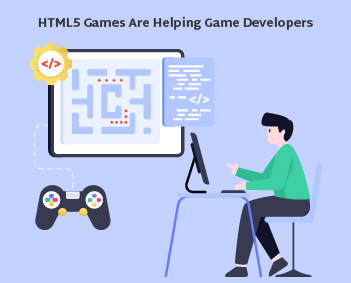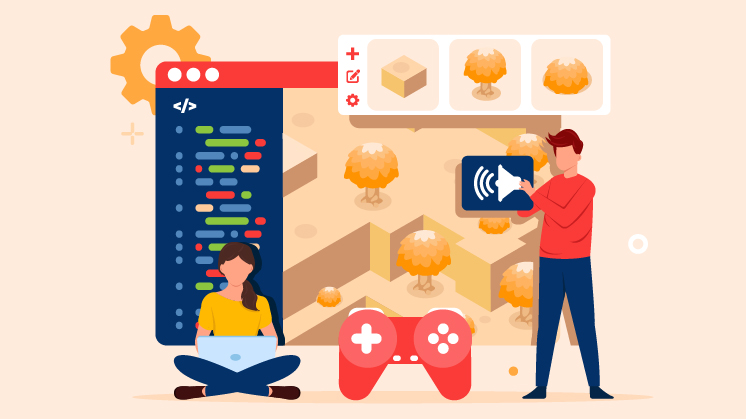HTML5 games are changing the way game developers create and share their work. These games, built with web tech, offer new options for big and small developer teams. With the rise of mobile devices and web-based platforms, HTML5 has become popular for indie developers and large studios.

This comprehensive blog post explores the potential of HTML5 game development, examining its benefits, applications, and how it can empower developers to create successful and accessible games.
What are HTML5 Games?
HTML5 games are video games designed and developed using HTML5, JavaScript, and CSS. They run entirely within a web browser, eliminating the need for downloads or installations. HTML5 games offer a convenient and accessible way for players to enjoy games on any device with an internet connection.
Here’s a breakdown of the core technologies used in HTML5 game development:
- HTML5: Provides the structure and foundation of the game, defining the layout and elements.
- JavaScript: Adding interactivity, animations, and game logic brings the game to life.
- CSS: Manages the visual style and appearance of the game elements.
Is HTML5 Useful for Game Development?
Absolutely! HTML5, JavaScript, and CSS form the foundation of modern web development. These technologies, once primarily used for static web pages, have evolved to become powerful tools for building interactive and engaging games.
Here’s why HTML5 is a valuable asset for game developers:
- Cross-Platform Compatibility: HTML5 games run seamlessly within web browsers, eliminating the need for platform-specific downloads or installations. This allows developers to reach a wider audience across desktops, laptops, tablets, and smartphones without creating separate versions for each device.
- Reduced Development Costs: Compared to traditional game development methods, HTML5 offers a cost-effective approach. Developers can leverage existing web development skills and tools to streamline the development process and minimize resource requirements.
- Easier Distribution and Updates: HTML5 games are deployed directly on web servers, making distribution and updates a breeze. Players simply need to refresh the web page to access the latest version, eliminating the need for app store approvals or manual updates on individual devices.
- Engaging User Experience: Modern HTML5 games can deliver rich graphics, smooth animations, and immersive sound effects, creating engaging experiences for players.
Some key facts about HTML5 games:
- They work on many devices (computers, phones, tablets)
- They’re easy to update and fix
- They can be played offline
- They often load faster than other game types
HTML5 games can be simple or complex. You might find puzzle games, racing games, or even role-playing games designed using HTML5.
Can You Make Games with HTML5?
Yes, you can! HTML5, combined with JavaScript and CSS, provides a robust framework for building a variety of game genres. The possibilities are vast, from simple puzzle games to more complex strategy titles.
Here are some popular game genres well-suited for HTML5 development:
- Puzzle Games: Using logic and problem-solving makes them ideal for the web environment.
- Arcade Games: Fast-paced action and simple controls translate well to HTML5’s capabilities.
- Casual Games: Simple mechanics and short play sessions make them perfect for quick bursts of fun on any device.
- Card Games: Strategy and decision-making are core elements that can be effectively implemented in HTML5.
While some complex 3D games might require additional frameworks or plugins, HTML5 games demonstrate impressive capabilities for various genres.
Benefits Of Html5 Game Development For Web And Mobile
Choosing HTML5 game development helps you get many advantages for reaching a wider audience and simplifying the development process. Here’s a closer look at the benefits:
- Cross-Platform Compatibility: A single codebase can reach players on desktops, laptops, tablets, and smartphones, maximizing reach without additional development efforts.
- Simplified Distribution and Updates: HTML5 games are deployed on web servers, allowing for easy updates and distribution without app store approval processes.
- Reduced Development Costs: Leveraging existing web development skills and tools minimizes the need for specialized knowledge or expensive software, leading to cost-effective development.
- Accessibility and Monetization: HTML5 games can be easily integrated with advertising platforms or in-app purchases, offering accessible monetization options.
- Large Developer Community: A vast and active community of HTML5 developers provides valuable resources, support, and collaboration opportunities.
How Can I Develop HTML5 Games?
The process of developing HTML5 games involves several key steps:
- Concept and Design: Brainstorming game ideas, defining the target audience, and creating a game design document (GDD) outlining mechanics, features, and visuals.
- Coding: Developers build the core game logic, user interface, and interactions using HTML5, JavaScript, and potentially additional libraries or frameworks.
- Testing and Debugging: Rigorous testing is crucial to identify and resolve bugs, ensuring a smooth and enjoyable player experience. This involves testing across different browsers and devices.
- Deployment and Monetization: HTML5 games can be hosted on web servers, embedded within websites, or uploaded to online gaming platforms. Monetization options include in-app purchases, advertising, or subscription models.
How to Apply Effects and Animations to HTML5 Games
Animations and visual effects play a vital role in creating engaging HTML5 games. Here are some key methods to achieve this:
- CSS Animations: CSS provides built-in animation capabilities for creating smooth transitions, movements, and transformations within game elements.
- JavaScript Libraries: Several JavaScript libraries like Anime.js and PixiJS offer advanced animation features for more complex effects and particle systems.
- Canvas API: The HTML5 Canvas element allows for programmatic drawing and manipulation of graphics, enabling developers to create custom animations and visual effects.
Major HTML5 Game Development Software
Several powerful tools and software options can streamline the HTML5 game development process:
- Visual Studio Code: A popular and free code editor offering syntax highlighting, code completion, and debugging features for JavaScript development.
- Construct 3: A game development platform with a visual drag-and-drop interface, ideal for creating 2D games without extensive coding knowledge.
- Phaser: A free and open-source JavaScript framework providing a robust foundation for building various HTML5 games.
- Unity: While primarily known for 3D game development, Unity’s powerful scripting capabilities can also be used to create high-quality 2D HTML5 games.
Is HTML5 Good For Game Development?
HTML5 game development offers a compelling option for developers seeking to create accessible, cross-platform games. While it might not be suitable for highly complex 3D titles, its numerous advantages make it a powerful tool for various game genres. Here’s a quick recap of the reasons to consider HTML5 game development:
- Cross-platform compatibility: Reach a wider audience without separate development for each platform.
- Reduced development costs: Leverage existing web development skills and tools for a cost-effective approach.
- Easier distribution and updates: Deploy and update games directly on web servers, streamlining the process.
- Large developer community: Access valuable resources, support, and collaboration opportunities.
- Accessibility and monetization: Offer easy access to players and explore various monetization options.
Advanced Techniques in HTML5 Game Development
While the core technologies of HTML5, JavaScript, and CSS provide a solid foundation, HTML5 game development can be further enhanced with additional techniques and tools. Here’s a deeper dive into some advanced concepts:
- Physics Engines: For games that require realistic physics simulations, libraries like Matter.js and Box2D can be integrated to handle object collisions, gravity, and movement.
- Web Audio API: This API allows developers to create immersive and dynamic sound effects, adding another layer of depth to the gameplay experience.
- WebGL: For games requiring 3D graphics, WebGL provides a powerful API that leverages the graphics processing unit (GPU) for hardware-accelerated rendering of 3D models, textures, and lighting effects.
- WebSockets: This technology enables real-time communication between the server and client, allowing for features like multiplayer functionality and live updates within HTML5 games.
Monetization Strategies for HTML5 Games
HTML5 games offer a variety of ways for developers to generate revenue and turn their passion into a profitable venture. Let’s explore some popular monetization strategies:
- In-App Purchases: Players can purchase additional game content, power-ups, or virtual items within the game itself. This approach is widely used in freemium games, where the base game is free to play, but additional features require purchases. This concept is also popular in SaaS platforms and booking tools.
- Advertising: Developers can generate revenue by seamlessly integrating advertising networks within the game. This can be done through banners, videos, or rewarded ads, where players receive in-game rewards for watching ads.
- Subscription Model: Offer premium features or exclusive content through a subscription service, giving players access to a more enriched and ongoing experience. This model works well for games with continuous updates and new content releases.
- Sponsorship and Brand Integration: Partnering with brands or companies allows for integrating their products or logos within the game. This can be lucrative for games with a large and engaged player base.
Marketing and Distribution Strategies
Developing a compelling HTML5 game is only half the battle. Creating a successful game requires effective marketing and distribution strategies to reach your target audience. Here are some key considerations:
- App Store Optimization (ASO): If you choose to distribute your game through online gaming platforms or app stores, optimizing the game listing with relevant keywords and captivating descriptions is crucial for discoverability.
- Social Media Marketing: Leverage social media platforms like Twitter, Facebook, and YouTube to build a community around your game, share updates, and connect with potential players.
- Influencer Marketing: Collaborate with gaming influencers or streamers who can showcase your game to their audience, generating buzz and driving traffic to your game.
- Community Building: Create a dedicated website or forum for your game to foster a community of players who can share their experiences, provide feedback, and help promote the game organically.
The Future of HTML5 Game Development
The landscape of HTML5 game development is constantly evolving. With advancements in web technologies and the ongoing development of libraries and frameworks, we can expect even more exciting possibilities to come forward:
- Improved 3D Capabilities: Continued development of WebGL and other APIs will push the boundaries of 3D graphics achievable within HTML5 games.
- Virtual Reality (VR) and Augmented Reality (AR) Integration: The potential integration of VR and AR technologies with HTML5 games could usher in a new era of immersive gameplay experiences directly within web browsers.
- Enhanced Performance and Optimization: HTML5 games can expect even smoother gameplay and faster loading times as web technologies continue to improve.
- Cloud Gaming Integration: The rise of cloud gaming services could allow more complex and resource-intensive HTML5 games to be streamed directly to players’ devices.
Final Words
HTML5 games empower game developers with a powerful and accessible toolkit for creating engaging and interactive games. By leveraging the strengths of web technologies, developers can reach a global audience, reduce development costs, and explore various monetization strategies. As HTML5 game development continues to evolve, we can expect even more immersive games, removing the lines between traditional game development and web-based experiences.




